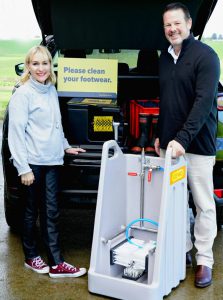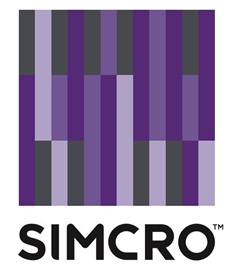About Us
We’re Jacson3 Limited, a family-owned, Waikato-based business with rural roots and heartland values.
We know that clean and disinfected boots and footwear is just one aspect of good farm biosecurity planning and practice. And it’s an important one.
We currently offer two solutions that can support your farm’s biosecurity footwear cleaning protocols.
The Jacson Cube® (winner of the 2018 New Zealand Biosecurity Awards innovation category) is a portable, all-in-one footwear biosecurity system for rural professionals visiting farms, orchards and nurseries, which is easily transported in the back of vehicles. It is also a good solution for farmers to use at secondary sites, such as grazing blocks and stock yards.
The PE Boot Cleaner is a permanently-situated solution, perfect for point-of-entry and exit use, that cleans boots exceptionally well and puts the health and safety of your team and visitors front and centre.
Clean boots are no longer optional. This means, unashamedly, making sure every person who steps foot on your property does so with clean and disinfected footwear.
Make it easy for you, your team and your visitors to protect what’s precious.
 Our story…
Our story…
Rusty grew up on a dairy farm and has been lucky enough to travel the world visiting farms and other agricultural businesses for much of his career. It was while travelling that he first experienced good on-farm biosecurity practices.
It was also while supporting his overseas colleagues during the 2001 UK foot and mouth outbreak, that he gained a deeper understanding of the financial and emotional devastation that occurs when disease does break out.
This knowledge lay dormant until the winter of 2016 when, during a short-term contract inspecting and buying calves, he realised New Zealand farmers were still leaving themselves exposed to significant business and emotional risks related to biosecurity.
“On more than one farm, I witnessed significant stress and losses in revenues for the farmers concerned as they struggled to restrict the spread of even common diseases, such as Rotavirus and Cryptosporidium, between their mobs of animals.
“And while we were attempting to thoroughly clean and disinfect our boots as we entered and left each property, it was difficult and awkward to do this with your basic bucket, brush and spray bottle combo,” Rusty said.
He was left with the overwhelming sense that there simply had to be a better way.
Good biosecurity starts with cleaned and disinfected boots
With the support of partner Jacqui, a communications consultant with Ag sector experience, Rusty set about developing a business model that could support their family while advocating a step-change in biosecurity thinking among both landowners and their agricultural business partners that regularly visit them.
Engaging a design engineer and undertaking market research were critical to the design process. The duo also conducted structured interviews with a panel of rural professionals, consultants and farmers to better understand attitudes towards biosecurity practices and get feedback on the proposed design of their footwear biosecurity system.
Jacqui said this research was undertaken before the recent outbreak of M.Bovis – and people’s attitudes were quite different to what they are today.
“When we did our market research, which was before M.Bovis came along, the folk we spoke to were aware of the need for good biosecurity practices, but there was some hesitation about being the one to lead it out. Rural professionals said they would do it if a farmer insisted, and some farmers said they’d be a bit embarrassed asking someone to clean their boots before they entered the property – especially if it was a long standing, trusted relationship,” Jacqui said.
That led the team to consider adding a signage solution to their offering to breakdown this hesitation and take away the personal element – so that it is purely and simply a business requirement.
Biosecurity is everyone’s business
Rusty said because of recent events, attitudes are changing, and now not a week goes by without a news story promoting the adoption of good biosecurity practices.
“We recognise that cleaned and disinfected boots are just one element of an adequate biosecurity plan. But it’s a start that will hopefully draw attention to the fact that it is critical for everyone to take responsibility to ensure they are not spreading weeds and disease vectors on and between farms, because when they do spread, they are incredibly costly,” Rusty said.
NZ Farmer (October, 2016) reported that a large outbreak of foot and mouth disease could cost upwards of $16BN and AgResearch (Agribusiness, 2017) conservatively estimates the cost of weeds to productive land across the country is $1.658BN per year. Farmers Weekly (April 2014) reported that one outbreak of Rotavirus on an average dairy farm could cost more than $6,000 in treatment, lost condition and calf deaths.
An opportunity to show leadership
Rusty said farmers already have a significant job to do mitigating numerous risks inside the farm gate.
He said the German-engineered PE Boot Cleaner combined with signage asking people to clean their footwear is one solution that is easily added to entry and exit biosecurity protocols to minimise the risk of disease vectors being transmitted on to farm.
“But we’re also highlighting that Ag supply and service businesses have a leadership role to play in demonstrating good practice when visiting farms and orchards.
“Though the vet sector has long taken steps to mitigate this risk, our invention, the portable Jacson Cube®, will make it much easier for other supply and service businesses to also show leadership in this space and add their voices and actions to the call for change.”
Working in partnership
The Jacson Cube® is very much a product of New Zealand. Rusty and Jacqui have been assisted to bring their design to life by:





